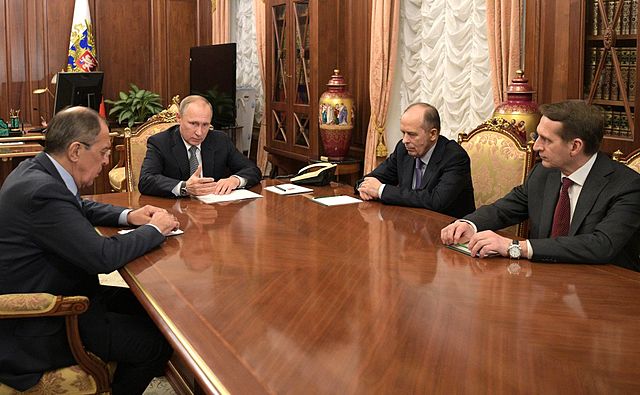Putinism is the social, political, and economic system of Russia formed during the political leadership of Vladimir Putin. It is characterized by the concentration of political and financial powers in the hands of "siloviks", current and former "people with shoulder marks", coming from a total of 22 governmental enforcement agencies, the majority of them being the Federal Security Service (FSB), Ministry of Internal Affairs of Russia, Armed Forces of Russia, and National Guard of Russia. According to Arnold Beichman, "Putinism in the 21st century has become as significant a watchword as Stalinism was in the 20th."
Vladimir Putin in a rally in Sevastopol before the 2018 Russian presidential election
Russian President Putin with religious leaders of Russia, 2001. Putin has promoted religious traditionalism and the rejection of some Western liberal principles, like toleration of homosexuality.
Sergey Karaganov, who is considered close to Putin, formulated many of the core ideas that led to Russia's invasion of Ukraine.
Nikolai Patrushev and Sergei Ivanov with Vladimir Putin on 8 April 2015
In the Russian political lexicon, a silovik is a person who works for any state organisation that is authorised to use force against citizens or others. Examples are the Russian Armed Forces, the Russian national police, Russian national drug control, Russian immigration control (GUVM), the Ministry of Justice, the Federal Security Service (FSB), former KGB personnel, GRU, the Foreign Intelligence Service (SVR), and the Federal Protective Service (FSO). This word is also used for a politician who came into politics from these organisations.
Sergei Ivanov and Nikolai Patrushev at a meeting of Vladimir Putin with officers and prosecutors appointed to senior positions, April 2015
Putin with Sergey Lavrov, Alexander Bortnikov, and Sergei Naryshkin, 19 December 2016
Igor Sechin is often described as one of the closest siloviki to Vladimir Putin. His nickname is Darth Vader [citation needed].






![Igor Sechin is often described as one of the closest siloviki to Vladimir Putin. His nickname is Darth Vader [citation needed].](https://upload.wikimedia.org/wikipedia/commons/thumb/7/7d/Igor_Sechin1_%28cropped%29.jpg/468px-Igor_Sechin1_%28cropped%29.jpg)